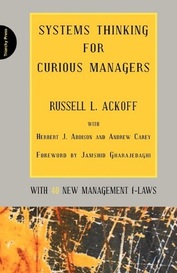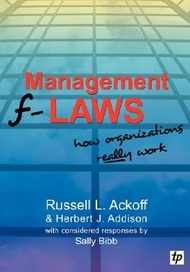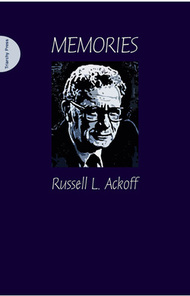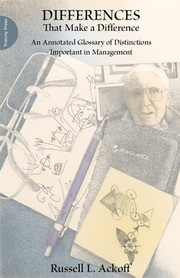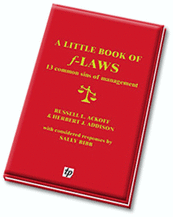AUTHORS: Russell Ackoff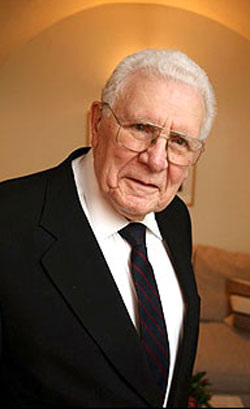 Russell Ackoff
The late Russell L. Ackoff was the Anheuser-Busch Emeritus Professor of Management Science at The Wharton School, University of Pennsylvania. He wrote numerous books on Systems Management, the most recent of which were Beating the System, co-authored with Sheldon Rovin, Re-Designing the Corporation, Ackoff's Best and Idealized Design, co-authored with Jason Magidson and Herbert J. Addison.
A founding member of the Institute of Management Sciences, his work in consulting and education involved more than 350 corporations and 75 government agencies in the United States and beyond. Management grandee, he was ranked 26 in a recent list of the world's most influential business thinkers. Russ wrote five books for Triarchy (though two of them overlap). You'll see them on the right. Read on for extracts from some of the outpouring of memories, remembrances and obituaries that followed his death in 2009: From the Ackoff Collaboratory: Professor Russell L. Ackoff has been described as a Renaissance Man, architect, city planner, philosopher, behavioral scientist, trailblazer in the field of organizational operations, the pre-eminent authority on organizational systems theory, best-selling author, world traveler even a humorist. Recognized internationally as a pragmatic academic, Russ, as he was known to all, devoted most of his professional life to dissolving complex societal and organizational problems by engaging all stakeholders in designing solutions. Born in Philadelphia to Jack and Fannie (Weitz) Ackoff, he completed undergraduate studies in Architecture at the University of Pennsylvania in 1941. From 1942 to 1946 he served in the U.S. Army, stationed in the Philippines. Upon returning from the war, he obtained a doctorate in the Philosophy of Science from Penn, where he met and married Alexandra Makar. From 1947 to 1951 Dr. Ackoff was Assistant Professor in Philosophy and Mathematics at Wayne State University. It was here that he first sought to establish an institute devoted applying philosophical beliefs about the nature of man to the design and improvement of social institutions. In 1951, Ackoff and a group of colleagues were invited to join the Case Institute of Technology School of Engineering, where they were instrumental in establishing one of the world's first Departments of Operations Research, an accomplishment that still identifies Ackoff as the Father of Operations Research. In 1964 the fledgling graduate business program at the Wharton School recruited Ackoff and his colleagues. In 1980, the Social Systems Sciences Department was established at Wharton. This innovative program combined organizational design theory and practice, sought to escape traditional disciplinary bounds, and cultivated students motivated by independent thought and action. Read the rest of this article... From the Philadelphia Inquirer When the Wharton School of the University of Pennsylvania hired Russell L. Ackoff in 1964, it didn't get one man. It got an eight-person team. Director of the Operations Research Group at Case Institute of Technology in Cleveland at the time, he brought along seven of his colleagues to form the statistics and operations research department at Wharton. The hiring paid off. In 1971, in London, he received the silver medal of the British Operational Research Society. Read the rest of this article... From the Huffington Post The world lost a very great man this past Thursday. So great, in fact, that the only person I can compare him to is Einstein. And that's because this man - Russell L. Ackoff, Professor Emeritus of The Wharton School - transformed the world of problem solving just as Albert Einstein transformed he world of science. Russ was my friend and mentor for the last 10 years and was 90 years old when he passed away from complications resulting from hip replacement surgery. Why I compare Russ Ackoff to Albert Einstein Before Einstein and his fellow physicists made their discoveries early in the 20th Century, the scientific world assumed that our universe was - essentially - a "giant clock." This mechanical view of the universe was made obsolete by the discovery of Quantum Mechanics, through which the universe was redefined as being an interrelated and interconnected series of waves... of patterns of energy. (I'm using short-hand language here.) The bottom line: computers could not exist without Quantum Mechanics, because its principles make possible how computer chips work. Mechanical view of the universe... no computers. Quantum Mechanics... computers (and a whole lot more). It's that simple. Well, before Russell Ackoff and his fellow organizational development theorists made their discoveries in the period following WWII, the management world assumed that solving the problem of how to make organizations work better required using Analysis: breaking the problem (the organization) up into its component parts... fixing those parts (including "those people") that were broken... and putting the organization back together, with the expectation that it would then work. This was also a "giant clock" philosophy. This mechanical view of problem-solving was made obsolete by the development of Systems Thinking, through which making organizations work better was redefined in recognition of the role played by the design of the entire system. Synthesis - the thinking method involving seeing how different elements in a system interact with each other - replaced Analysis as the method of developing breakthrough operational improvements (otherwise known as Innovation). Read the rest of this article... From The Economist In praise of the ideas of Russ Ackoff IT IS hard to imagine a less enticing title for a book than Introduction to Operations Research. Yet Russ Ackoff, one of the authors of this tome of 1959, who died on October 29th aged 90, did not just help to define a nascent branch of industrial engineering. He wrote 30 other books, becoming one of the most influential management gurus of the 20th century in the process. His ideas about systemic thinking are vitally important today if the world is to come out of the current economic crisis in better shape than it went into it. Today's crisis is the result of a catastrophic failure, primarily in the financial system but also of our economic and political systems. Mr Ackoff spent most of the past half-century as the premier evangelist of systemic thinking, which he contrasted with the reductionist, atomistic thinking that had long dominated humanity's approach to problem-solving in his view. Time and again, he would point out, decision-makers faced with crises failed to heed Albert Einstein's warning that we can't solve problems by using the same kind of thinking we used when we created them. Read the rest of this article... From the Financial Times Fond farewell to a brilliant thinker Ackoff’s death, even at the impressive age of 90, has provoked an outpouring of expressions of regret and admiration from former students and colleagues. I suspect that some of them feel his work never quite received the recognition it deserved. He remained a too well-kept secret. Listen to that clever and humane voice one more time: “The only problems that have simple solutions are simple problems. The only managers that have simple problems have simple minds. Problems that arise in organisations are almost always the product of interactions of parts, never the action of a single part. Complex problems do not have simple solutions." Read the rest of this article... |
Russ Ackoff's books:
For a great set of video clips, talks, quotes and a bibliography see the FearlessRevival page on Russ Ackoff. |


